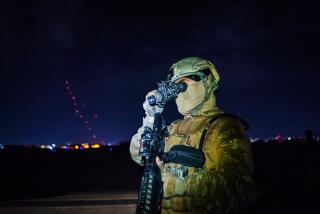Is Collective Security Just a Chimera? : Three things are required: U.S. leadership, Soviet cooperation and willingness to use force as a last resort.
- Share via
The Cold War has not quite been laid to its final rest when the international community finds itself rudely disabused of any notion that a time of grace will follow automatically. The post-Cold War world could be a better, more peaceful one than we have known for several generations. Or it could be a world replete with new terrors of its own--the terrors of anarchy.
The U.N. Security Council acted with uncommon speed and unanimity in condemning the Iraqi invasion. This was exactly what the U.N. founders--and before them, the founders of the League of Nations--had in mind. Peace would rest on a system of “collective security” in which all the other nations would join forces against any aggressor. The system has not worked because the superpowers’ interests have been so antagonistic and so ubiquitous. In most local conflicts the two would end up on opposite sides, thereby paralyzing the United Nations.
The demise of the Cold War opens the door to international cooperation to uphold peace and world law. But by the same token it makes less likely unilateral action by the United States or the Western alliance. Were Kuwait still a pawn on the East-West chess board, the American reaction to Iraq’s threats would not have been so muted. The abatement of American and Soviet fears of each other could have the ironic consequence of leaving local bullies, like Iraq’s Saddam Hussein, freer than before to throw their weight around.
The alternative to such an unhappy outcome is for the community of nations to thwart aggressors. In this instance, that means to compel Iraq to withdraw from Kuwait unconditionally, without leaving behind a puppet government and without securing any of the demands on which it based its attack. It is good that the Security Council passed a resolution. But can it be enforced?
Even before the Cold War, collective security had failed. In the 1930s, when Japan attacked Manchuria and Mussolini’s Italy conquered Abyssinia, the League of Nations responded with ineffectual diplomatic and economic slaps on the wrist. No nation wanted to risk the ire of the aggressors or interrupt its own commerce.
The same spirit of greed and cowardice are afoot in the world today. Indeed, it has been abundantly in evidence toward Iraq in recent years. Although Saddam Hussein launched aggressive war against Iran, used poison gas on his own Kurdish subjects and threatened Israel with weapons of mass destruction, Western governments have collaborated shamelessly in the development of Iraq’s military industries, including its potential for chemical and nuclear warfare.
If collective security is to be any more successful after the Cold War than it was before, that selfish, pusillanimous spirit will have to be overcome. This will require three things: American leadership, Soviet cooperation and willingness to use force as a last resort.
The Cold War’s end leaves America more than ever the world’s premier power. America also tends to be the most idealistic country. We must set an example of courage and principle for others to follow. The alternative is collective inaction.
As for the Soviet role: Mikhail Gorbachev’s “new thinking” has wrought a revolution in Soviet external behavior. It has turned away from imperialism toward cooperation. It has helped to solve local conflicts in Namibia and Nicaragua, and there are signs that it is cooperating in a similar way in several other countries. A further step of cooperation would be for the Soviets to join with America, the moderate Arabs and others in united action against Iraqi aggression.
It is possible that strong enough diplomatic and financial pressures will lead Iraq to back down. It is a country with some formidable enemies--Syria, Israel, Iran. This may make it especially vulnerable to international isolation. But non-martial pressures will be all the more effective if Iraq knows that the other nations are ultimately prepared to take whatever measures are necessary to reverse its aggression.
More than Kuwait’s sovereignty is at stake. Successful collective action could spell the beginning of a new, more peaceful era. Failure to act would set a precedent of a different sort. It would suggest that the end of the Cold War, while leaving the superpowers more secure, will also leave them more indifferent to the fate of small countries that may find themselves more vulnerable than ever.
More to Read
Sign up for Essential California
The most important California stories and recommendations in your inbox every morning.
You may occasionally receive promotional content from the Los Angeles Times.













